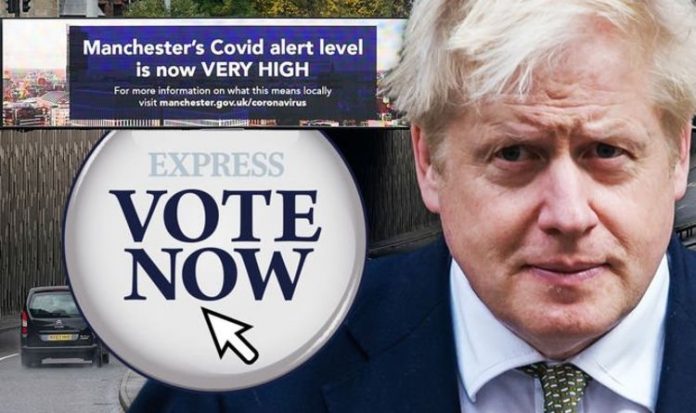Earlier this month, Boris Johnson and his Government introduced a new three-tier lockdown system in a desperate bid to control a rapidly accelerating second wave of COVID-19 infections. The highest alert system – Tier 3 – states households in affected areas are not allowed to mix indoors or in private gardens. Pubs and bars must close unless they can operate as restaurants, while a number of travel restrictions are also in place.
Liverpool was the first major region of England to enter Tier 3 earlier this month, with several other areas in the north of the country quickly following as coronavirus infections continue to surge at an alarming rate.
Within the next few days, nearly a fifth of England will be hit with the strictest coronavirus restrictions.
On Friday morning, Nottinghamshire entered Tier 3 of the Government’s lockdown system, while West Yorkshire will move to the highest alert level from Monday.
That would take the total number of people in Tier 3 to just over 11 million – 19.6 percent of the population.
Tees Valley and the West Midlands are also expected to be moved to the highest level of restrictions, meaning millions more people could soon be hit by the strict rules.
London entered Tier 2 earlier this month but is edging towards Tier 3, with a case rate of 151 per 100,000 people from October 17 to 23.
The Prime Minister has come under huge pressure from politicians, local leaders and scientists following the introduction of the three-tier system.
He is insisting a localised approach is the best method of tackling the coronavirus pandemic.
READ MORE: Three signs you have the common cold and not COVID-19
Several areas in the North of England, where coronavirus cases are rising at a rapid rate, have complained they have been unfairly treated by being placed into Tier 3.
Mr Johnson has even faced a rebellion from within his own Conservative Party, with MPs writing to him to warn his strategy could have long-lasting damage to jobs and the local economies in the North of England.
They also warned he risks losing several seats the Tories worked so hard to win from Labour during last December’s general election, which saw the Opposition’s infamous “Red Wall” crumble.
But ministers are continuing to defend the use of regional measures to fight rising coronavirus infections in England – despite mounting pressure to introduce a national lockdown.
DON’T MISS
TRIPLE TAX WHAMMY is coming -we have to pay for Covid somehow [OPINION]
London lockdown: Will London go into Tier 3? [ANALYSIS]
Londoners could REJECT stay-at-home pleas [LATEST]
On Friday, Foreign Secretary Dominic Raab insisted the Government is “striving” to avoid issuing blanket restrictions throughout the country and said targeted measures could slow the growth in cases.
Mr Raab was asked whether ministers had been given a “very, very bleak” presentation by scientists just 24 hours earlier about rising cases and the future death toll.
He told BBC Radio 4’s Today programme: “We are very careful to protect the integrity of the discussions and the information we have, but we do think the situation is serious.
“Having said that, we’re confident we’ve got the right measures and framework in place – which is not to have a blanket approach – with the target measures, both in terms of restrictions but also financial support on the areas where the uptick is the highest.
Asked about the possibility of a Tier 4 higher level of restrictions being introduced, Mr Raab warned: “We’re always ready for further measures that we can take, but I think the most important thing about further measures is that we continue on the track that we’re on of targeting the virus.
“The difference between now and the first lockdown is we’re in a much better place to really focus on where the virus is the greatest and I think that’s right, not only in scientific and virus management terms, but I think in terms of the way people feel about tackling this virus.
“It’s fair that it fits the natural justice that we’re focusing on the areas where the uptick is the greatest, and we’re not taking a one-size-fits-all approach or a blanket approach or a blunt approach, so we’ll continue down that path.”
“We have seen, since we adopted that approach, a decrease in the rate of growth, but clearly there is still an uptick in the virus. We are battling a second wave, and we’re going to do everything we can, in a targeted and focused way, to repress and bring those numbers back down.”







